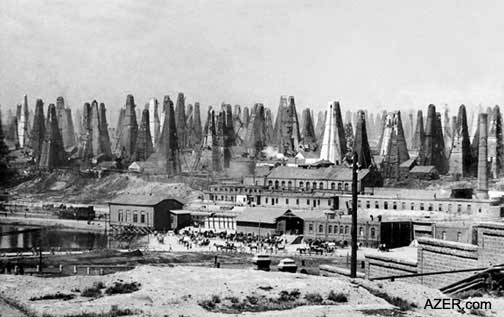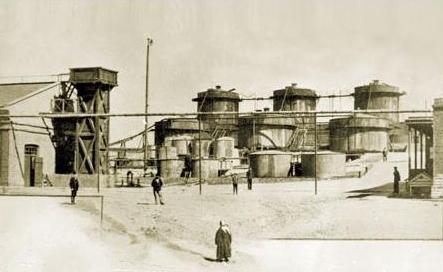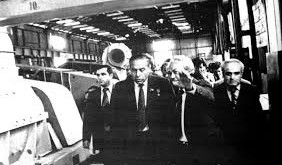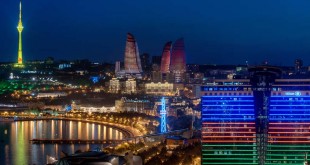
Disagreements about the ethnic make-up of the Nobel Brothers company continue to this day. I agree with famous Russian chemist Dmitry Mendeleyev’s
description of the company as “a mixed Swedish Russian” firm. As Friedrich Engels put it in one of his letters, “Together with the native Scandinavian features, one can see some Slavic cheekbones in this company’s face.”
By the early 20th century the Nobel Brothers company had become the dominant company in Azerbaijan. In 1917 the company consisted of more than 20 subsidiary firms with a total capital investment of more than 130 million roubles. The capital of the firms attached to another of the major oil companies in Baku, the Russian Central Oil Corporation, London, was in all 93.6 million roubles. [2]
However, this does not mean that the local oil industrialists backed out of the industry with the arrival of the Nobels. On the contrary, they put up a real struggle against the brothers’ company.
As they sought to develop their business, the Nobel Brothers were not satisfied with only what were known as the old oil districts (Balakhani, Sabunchu, Romana, Bibiheybat). They considered Binagady district a potentially profitable new field. Binagady district was the hillier part of Baku, from the southwest to the north. It included the villages of Binagady, Fatmayi, Bibi-Heybat, Shubany, Keyreki and Khirdalan. In 1908 the Binagady Oil & Trade Company established oil production on this territory. In reality it was the Nobels who set up this firm. They set it up as a subsidiary with independent legal status.
Small-scale and new oil producers had their hands tied by the requirements of “market prices” or tariffs. This system could really be called “concessionary tariffs” and the real concessions were always in the hands of the Nobel Brothers company.
Some of the larger companies also had concessionary tariff agreements with the Nobels. When the government allotted 37.2 dessiatina (2.7 acres) of land to the Safaraliyev Brothers Company to extract oil, the Nobel Brothers immediately began to force them to sign a contract to sell all their oil products to the Binagady Alliance at a favourable price. Under the terms of a document signed between the companies, the Safaraliyev Brothers did not have the right to build their own oil receiving station or to receive oil products from other producers. [4]
By dictating their own conditions to others the Nobel Brothers company could easily weaken or even liquidate their opponents. When the A. & M. Bunyadov Brothers alliance took the Khirdalan oil pipeline into their own hands, they could have put up real competition against the Nobel Brothers. Nobel brokers sent the Bunyadovs an extraordinary ultimatum: “All the products received by the oil pipeline must be sold to the Binagady Alliance only with 1? kopecks abatement, otherwise the fixed medium exchange oil price abatement will be reduced from four kopecks to one kopeck.” This ultimatum could have lost the Bunyadov Brothers all their customers in just one year and left them bankrupt.
 Nobel Brothers’ kerosene plant in Baku
Nobel Brothers’ kerosene plant in BakuThere are many examples of the Nobel Brothers exploiting their dominant position in the market in the new oil districts. However, careful analysis of the archives reveals that these attempts at monopoly did not always end successfully for the Nobel Brothers company. The long struggle between Baku millionaire Agabala Guliyev and the Nobel Brothers is evidence of this.
When Agabala Guliyev heard about the opening of a new oil receiving station in Binagady district, the Binagady Company and brokers for the Nobel Brothers began to discuss this. Since Guliyev did not do what was asked of him, the Nobels adopted a resolution: “Should it be necessary, a price struggle is to be used immediately”. [5]
Guliyev had no intention of conceding to the Nobels. He proposed selling 100,000 poods of oil products to the Nobel Brothers company per month, or 1.2m poods per year in 1914; 306,000 poods per month, or 3.6m per year in 1915-1916 (a pood was equivalent to 16.38 kg). The price for each pood of crude oil was to be based on the price established by the price Commission of the Baku Exchange Committee, with a half kopeck abatement. The oil had to be passed to plants operating in the Black City only. [6]
But the Nobels always preferred a long-sighted policy and refused 300,000 poods of crude oil per month. This was no small figure for a new oil district. After some time Guliyev received a letter of refusal from the Nobel Brothers head office in Petrograd, a sign that the Nobel Brothers considered him a serious opponent.
After receiving the negative response from the head office, Guliyev began to enlarge his own company and made an offer to local oil producers to sell him their oil at a suitable price.
The Nobel Brothers used their usual competitive methods to try and entice all those local oil producers to sign a contract to sell their oil products to them at a concessionary price. They were offered a price of four kopecks against the three kopecks per pood paid by Guliyev’s company at that time.
This was a great expense for the Nobel Brothers company. Agabala Guliyev must have become a real headache for them.
At the same time, Guliyev did not underestimate the power of the Nobel Brothers company. When competition between the companies was tough, Guliyev made an offer to all the oil extractors to organise a joint oil receiving station in Binagady district. [7] The offer read: “One-third of the oil extracted in the Binagady district is to be singled out for A. Guliyev’s oil pipeline for rent by the Nobel Brothers company at a price of 10,000 roubles per month.” It was a very risky offer. If it had been accepted, Guliyev would have been the third or even the second shareholder in the Nobel Brothers company in Binagady district. [8] The Nobel Brothers refused the offer and soon afterwards they began to build a new station near Guliyev’s oil receiving station.
At that time other companies were well-placed to take advantage of the discord between the Nobel Brothers and Guliyev’s company. The companies Dayanat and Safaraliyev & Co. both approached the Nobel Brothers’ brokers to sign contracts on beneficial terms, otherwise they would approach Guliyev’s company with the same offer. They were not afraid to play off the Nobel Brothers company against Guliyev’s company. The terms offered by Dayanat and Safaraliyev & Co. were not favourable for the Nobel Brothers, but neither was the prospect of them joining forces with Guliyev’s company. [9]
In Binagady district Dayanat and Safaraliyev & Co. had the biggest oil pipelines. By accepting the two companies’ terms, the Nobel Brothers were able to neutralize Agabala Guliyev as a serious competitor. Competition between the Nobels and Guliyev lasted from 1914 to 1918, which was remarkable given the dominant position of the Nobel company at that time and Guliyev’s status as a small-time oil producer.
Bibliography
 Oval Useful news from Azerbaijan and Caucasus
Oval Useful news from Azerbaijan and Caucasus

